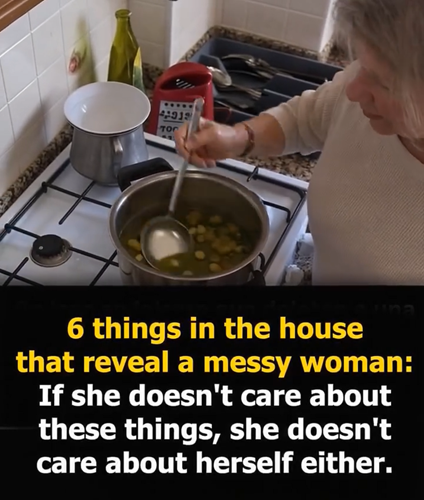
The condition of a home often reveals more than just a person’s cleaning habits—it can quietly speak volumes about their emotional and mental well-being. According to many psychologists and mental health experts, a cluttered, messy, or neglected living space is not always the result of laziness or poor time management. In many cases, it’s a reflection of deeper emotional struggles such as chronic stress, mental fatigue, depression, or a general feeling of being overwhelmed by life.
When we’re emotionally drained, our environment often becomes a silent witness. Certain areas in the home tend to show this more clearly. For instance, a bathroom that hasn’t been cleaned or maintained might suggest that the person living there is having trouble keeping up with personal care routines—something that’s common when someone is feeling mentally low. An unmade bed may seem small or insignificant, but it can point to a lack of daily structure or motivation. Similarly, laundry that keeps piling up may indicate that someone is overwhelmed, lacking the energy to stay on top of everyday tasks.
The kitchen, often the heart of a home, can also reflect emotional well-being. A cluttered or greasy kitchen may signal that someone is burned out or no longer finds joy in the rituals of cooking or eating. Broken items that stay unfixed for weeks or even months may not just show procrastination—they can also be signs that a person feels stuck or doesn’t have the energy to address even small problems. Empty or undecorated rooms can reflect emotional detachment, a lack of connection to one’s living space, or even a feeling of disconnection from life itself.
These signs don’t necessarily scream for attention, but they often act as quiet indicators that something deeper may be going on. And while these observations are not meant to shame or criticize, they are important to notice. Our homes, in many ways, mirror what we carry inside us. When we are in a good place emotionally, we tend to create environments that feel warm, organized, and nurturing. But when we’re struggling internally, our outer world often starts to reflect that struggle too.
Recognizing this connection between our emotional state and our environment is a powerful first step—not to judge ourselves, but to understand what we might be needing. And the good news is that emotional healing can often start with small, manageable changes in our surroundings. Simple actions—like tidying up a room, making the bed in the morning, doing the dishes, or fixing something that’s broken—can slowly begin to restore a sense of balance and control.
These actions may seem minor, but they can have a meaningful impact. They show care, intention, and a desire to reconnect—with ourselves, with our space, and with life. When we begin to care for our home, we are also choosing to care for our emotional health. Creating a living space that feels safe, peaceful, and alive can help support healing and well-being, one small step at a time.
The condition of a home often reveals more than just a person’s cleaning habits—it can quietly speak volumes about their emotional and mental well-being. According to many psychologists and mental health experts, a cluttered, messy, or neglected living space is not always the result of laziness or poor time management. In many cases, it’s a reflection of deeper emotional struggles such as chronic stress, mental fatigue, depression, or a general feeling of being overwhelmed by life.
When we’re emotionally drained, our environment often becomes a silent witness. Certain areas in the home tend to show this more clearly. For instance, a bathroom that hasn’t been cleaned or maintained might suggest that the person living there is having trouble keeping up with personal care routines—something that’s common when someone is feeling mentally low. An unmade bed may seem small or insignificant, but it can point to a lack of daily structure or motivation. Similarly, laundry that keeps piling up may indicate that someone is overwhelmed, lacking the energy to stay on top of everyday tasks.
The kitchen, often the heart of a home, can also reflect emotional well-being. A cluttered or greasy kitchen may signal that someone is burned out or no longer finds joy in the rituals of cooking or eating. Broken items that stay unfixed for weeks or even months may not just show procrastination—they can also be signs that a person feels stuck or doesn’t have the energy to address even small problems. Empty or undecorated rooms can reflect emotional detachment, a lack of connection to one’s living space, or even a feeling of disconnection from life itself.
These signs don’t necessarily scream for attention, but they often act as quiet indicators that something deeper may be going on. And while these observations are not meant to shame or criticize, they are important to notice. Our homes, in many ways, mirror what we carry inside us. When we are in a good place emotionally, we tend to create environments that feel warm, organized, and nurturing. But when we’re struggling internally, our outer world often starts to reflect that struggle too.
Recognizing this connection between our emotional state and our environment is a powerful first step—not to judge ourselves, but to understand what we might be needing. And the good news is that emotional healing can often start with small, manageable changes in our surroundings. Simple actions—like tidying up a room, making the bed in the morning, doing the dishes, or fixing something that’s broken—can slowly begin to restore a sense of balance and control.
These actions may seem minor, but they can have a meaningful impact. They show care, intention, and a desire to reconnect—with ourselves, with our space, and with life. When we begin to care for our home, we are also choosing to care for our emotional health. Creating a living space that feels safe, peaceful, and alive can help support healing and well-being, one small step at a time.